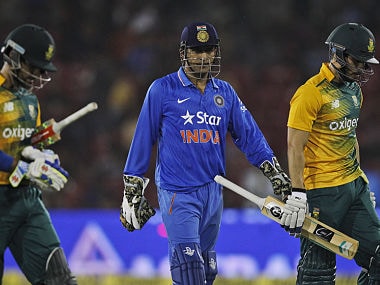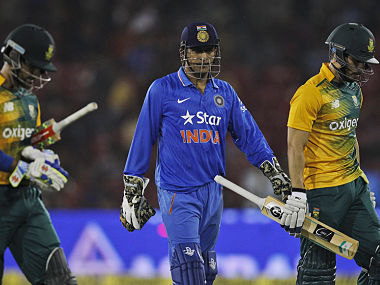Spot the odd one out: Over the last two years, India has played 19 Tests, 54 one-day internationals and 12 T20 Internationals, including the first two of the ongoing series against South Africa. That means prior to the South Africa series, India would have played at most 45 days of Test cricket (since not all those Tests lasted five days), 54 days of one-day cricket and assuming a T20 is half a day’s worth, five days of T20 cricket. [caption id=“attachment_2458738” align=“alignleft” width=“380”]
 Dhoni has been accused of many things over of the course of his career but over-thinking has never been one of them. AP[/caption] This, then, is the flaw in the BCCI’s money-first approach to T20s. They are attempting to prepare for a World Cup on the back of five days of T20 cricket over 24 months and hoping that cramming a bunch of games (nine scheduled currently) over the next six months will solve all their problems. The Indian Premier League is the golden goose and the board has protected its USP – India stars playing T20 cricket – from the start. It’s the reason no Indian player has been allowed to play in a T20 league in any other country, and why India has played just two handfuls worth of internationals over two years. But when a team rarely takes the field, the result is India has a limited idea of its best T20 combination or how the team is going toperform when it does take the field. That’s why we ended up with MS Dhoni, India’s most instinctive cricket and one who has played over 100 IPL games, saying something as ridiculous as he thinks too much in T20 cricket. Dhoni has been accused of many things over of the course of his career but over-thinking has never been one of them. But wait, I hear you cry. Indians have plenty of T20 experience from playing in the IPL every year. Well, yes, on an individual level, but not as a team. India’s players are scattered across eight teams and often play in positions where they compete against each other. Take Ajinkya Rahane for example. He has been Rajasthan Royals’ best player over the past few seasons and was the second highest run-getter in the 2015 season. Yet he can’t find a place in the India XI because he competes with Rohit Sharma and Shikhar Dhawan for the two opening positions. Likewise, Amit Mishra, who is the second leading wicket-taker in the IPL’s history and a legitimate IPL star, can’t get a look in because Dhoni prefers bowlers who can provide control, and control has generally been a legspinner’s Achilles heel. It is easier for a finger-spinner to be consistent than it is for a wrist-spinner. So, you have Axar Patel and Harbhajan Singh getting to turn their arm over but Mishra warming the bench despite having an excellent Test series in Sri Lanka. For some time now, the BCCI has been more concerned about keeping its coffers full than the quality of the cricket on the field. When India lost eight consecutive Tests to England and Australia four years ago, then BCCI president N Srinivasan said these things happen. He also told the Supreme Court that his greatest achievement for the BCCI was making it more money than any president before him. That’s a strange boast for an organisation which is still a non-profit on paper and whose reason for existence is running a sport, not making money. The good news is that those currently in charge of the board – new president Shashank Manohar and secretary Anurag Thakur – are making all the right noises about wanting India to be the best cricket team in the world. A good first step would be to release domestic players or those on the fringes of the national team, to play in leagues around the world so they can cope with foreign conditions in much the same way that foreign players are now familiar with India thanks to the IPL. Another would be to consider blooding the next generation in T20 Internationals in much the same way that ODIs became the route to the Test team for the previous generation — Virat Kohli and Rohit Sharma among them. After India lost the second T20I, and the series, to South Africa, Dhoni said he wants to bat up the order because he wants to find out who can handle the responsibility of finishing the innings — “unless they are exposed, you cannot tell who is good at it.” What he did not express was that India have chosen not to expose the players and now the team stands exposed instead.
Dhoni has been accused of many things over of the course of his career but over-thinking has never been one of them. AP[/caption] This, then, is the flaw in the BCCI’s money-first approach to T20s. They are attempting to prepare for a World Cup on the back of five days of T20 cricket over 24 months and hoping that cramming a bunch of games (nine scheduled currently) over the next six months will solve all their problems. The Indian Premier League is the golden goose and the board has protected its USP – India stars playing T20 cricket – from the start. It’s the reason no Indian player has been allowed to play in a T20 league in any other country, and why India has played just two handfuls worth of internationals over two years. But when a team rarely takes the field, the result is India has a limited idea of its best T20 combination or how the team is going toperform when it does take the field. That’s why we ended up with MS Dhoni, India’s most instinctive cricket and one who has played over 100 IPL games, saying something as ridiculous as he thinks too much in T20 cricket. Dhoni has been accused of many things over of the course of his career but over-thinking has never been one of them. But wait, I hear you cry. Indians have plenty of T20 experience from playing in the IPL every year. Well, yes, on an individual level, but not as a team. India’s players are scattered across eight teams and often play in positions where they compete against each other. Take Ajinkya Rahane for example. He has been Rajasthan Royals’ best player over the past few seasons and was the second highest run-getter in the 2015 season. Yet he can’t find a place in the India XI because he competes with Rohit Sharma and Shikhar Dhawan for the two opening positions. Likewise, Amit Mishra, who is the second leading wicket-taker in the IPL’s history and a legitimate IPL star, can’t get a look in because Dhoni prefers bowlers who can provide control, and control has generally been a legspinner’s Achilles heel. It is easier for a finger-spinner to be consistent than it is for a wrist-spinner. So, you have Axar Patel and Harbhajan Singh getting to turn their arm over but Mishra warming the bench despite having an excellent Test series in Sri Lanka. For some time now, the BCCI has been more concerned about keeping its coffers full than the quality of the cricket on the field. When India lost eight consecutive Tests to England and Australia four years ago, then BCCI president N Srinivasan said these things happen. He also told the Supreme Court that his greatest achievement for the BCCI was making it more money than any president before him. That’s a strange boast for an organisation which is still a non-profit on paper and whose reason for existence is running a sport, not making money. The good news is that those currently in charge of the board – new president Shashank Manohar and secretary Anurag Thakur – are making all the right noises about wanting India to be the best cricket team in the world. A good first step would be to release domestic players or those on the fringes of the national team, to play in leagues around the world so they can cope with foreign conditions in much the same way that foreign players are now familiar with India thanks to the IPL. Another would be to consider blooding the next generation in T20 Internationals in much the same way that ODIs became the route to the Test team for the previous generation — Virat Kohli and Rohit Sharma among them. After India lost the second T20I, and the series, to South Africa, Dhoni said he wants to bat up the order because he wants to find out who can handle the responsibility of finishing the innings — “unless they are exposed, you cannot tell who is good at it.” What he did not express was that India have chosen not to expose the players and now the team stands exposed instead.
Tariq Engineer is a sports tragic who willingly forgoes sleep for the pleasure of watching live events around the globe on television. His dream is to attend all four tennis Grand Slams and all four golf Grand Slams in the same year, though he is prepared to settle for Wimbledon and the Masters.
)